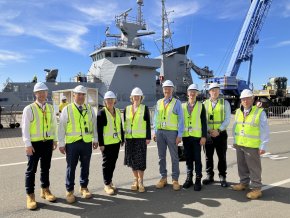Amen to this
@spoz - you are absolutely spot-on. One of the things that concerns me somewhat about the new Tier 2 frigates is that crew sizes of 90-100, while no doubt attractive in some ways, might not be sufficient in a shooting war - if the ship gets hit and there are people killed and wounded, there might not be enough people left for effective damage control. Smaller crews will also make it harder to keep up a high operational tempo for long periods. Increased automation might help to some extent, but evolutions like RAS would definitely require the whole ship's company. Close-formation evolutions such as RAS become increasingly dangerous when you have sleep-deprived people on watch for long periods - one momentary loss of concentration by one person could mean they or someone else gets injured or killed and/or the ship being damaged or even lost.
I'm someone who voted with their feet - after years of constantly being asked to ever more tasks with never enough people and aging ships and equipment, I got out of the RAN. It was a bitter pill to swallow as I loved the Navy and still do.
Sleep deprivation while on long deployments was a real problem - I did two deployments to the MEAO and no matter how hard everyone tried, human beings simply can't function effectively and safely after weeks of inadequate sleep. On my first MEAO deployment I recall the ship acting as plane guard for a US CVN, then doing a RAS, then being tasked with chasing down and investigating a formation of suspected pirate vessels (it turned out they were just fishing boats), then being called back to plane guard duties for the CVN, all in one 24 hour period - I don't think anyone got a chance to sleep. And that was after weeks of people not getting any more than 4 hours of sleep (and usually less) in any 24 hour period.
Sleep-deprived people become a danger to themselves, their shipmates, and other ships and their crews. And the RAN's solution wasn't to change procedures to address the problem, but rather to subject sailors who made mistakes out of utter exhaustion to disciplinary action. In each of my MEAO deployments I had a good, committed sailor in my division make an error that they would never have made if they hadn't been completely exhausted. I went in to bat for both of them as their divisional officer and pointed out that they were very competent and their mistakes were the result of systemic and procedural issues, but I was made to feel like I was committing heresy by questioning the way things were being done.
With a culture like that, no wonder there is a retention problem. I know plenty of people who left the RAN because they felt betrayed by Navy leadership and successive governments - I'm one of them.

